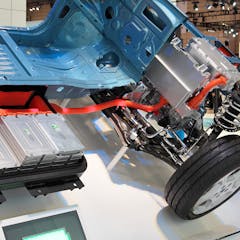
Articles on Batteries
Displaying 1 - 20 of 136 articles

The reason batteries come in so many types has as much to do with history as innovation.

It’s common to see solar panels on rooftops and fields, but they aren’t widespread on cars − yet.

China’s two largest EV battery makers are pledging to slash the cost of their batteries this year. Behind the pledge is a cost war – and new battery chemistries.

The temptation to justify critical minerals mining at all costs is a dangerous fallacy. The social and environmental impacts of poorly mined critical minerals are dire.

Batteries can power life-saving devices when implanted in the body, but they can also be deadly if inserted into cavities or ingested.

Lithium-ion battery fires are becoming increasingly common as electric vehicles spread, and are hard to extinguish. A new approach uses an electrolyte based on a commercial fire extinguisher.

Australia leads the world in rooftop solar per head. Can this small-scale power source be the secret weapon to fire up our struggling transition to net zero?

If big money is going to invest in clean energy and technology, the rules have to be clear. Australia’s launch of a green finance strategy last week was a good start but there is further to go.

More and more motorists are opting for bigger EVs – but there are several environmental concerns to consider.

Nanoparticles can help address a dependency on platinum — a rare and expensive material — to generate clean power.

Storing energy in large pumped hydro schemes sounds simple. But engineering and terrain challenges have put Snowy 2.0 well off track – while grid-scale batteries get better and better

Some power plants don’t have massive smokestacks or cooling towers – or even a central site.

Lithium-ion batteries power many electric cars, bikes and scooters. When they are damaged or overheated, they can ignite or explode. Four engineers explain how to handle these devices safely.

Lithium-ion batteries are holding back the full-scale decarbonization of Canada’s energy grid. Zinc-ion batteries may be the solution.

Our research has found 30,000 farm dams which could be used as energy storage. Solar by day, hydro by night.

Deep sea metallic nodules could help us shift to clean energy. But we don’t know how much damage it will do to ecosystems

We’ll need some new transmission lines to make Australia’s grid ready for the green energy shift. But there are clever ways of making more use out of our existing network.

Nearly 400 new mines could open by 2035 to meet demand for the minerals used in global electrification. Better recycling can help with supply, but mining’s impacts will have to be better managed.

One new battery plant is unlikely to save the UK auto industry, but it’s a step in the right direction.

Community batteries are popular. But that doesn’t mean they’re always the right tool for the job. We have to make sure they do what we want them to do





